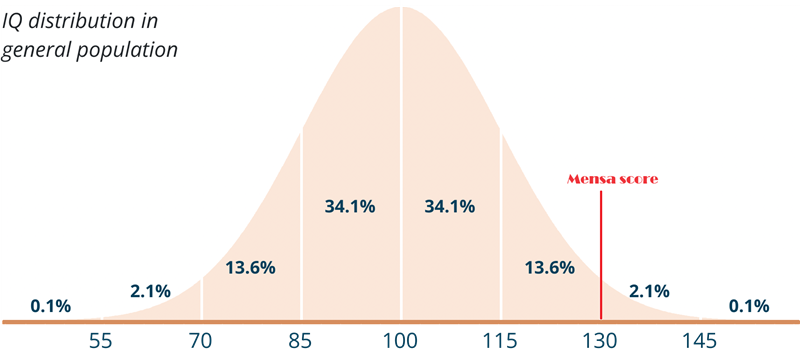Upon completing an IQ test, you may require assistance in determining your IQ score to gain a comprehensive understanding of its implications. Are you within the average IQ range, or do you possess a gifted IQ score? To answer this question, IQ scales have come to be used as a standardized measurement to assess human cognitive abilities. With a mean of 100 and a standard deviation of 15, the IQ scale provides a succinct overview of IQ score ranges.
The IQ scale, or Intelligence Quotient scale, is a standardized measurement used to assess and quantify human intelligence. The IQ scale serves as a standard for measuring cognitive abilities. Originating from Alfred Binet's work in the early 20th century, it has evolved into a widely accepted benchmark for assessing intellectual capabilities. Fundamentally, the IQ scale adheres to a standard normal distribution curve (or bell curve), with a mean value set at 100 and a standard deviation of 15.
The global IQ scores encompass a range between 40 and 160. However, the majority of people fall within the range of 85-115. Those achieving scores of 130 and above, representing the top 2% of the population, are acknowledged as individuals with exceptional intellectual prowess, commonly referred to as geniuses.
The IQ scale is often illustrated in the form of a graphic, as below:

IQ scores are typically standardized based on a mean score of 100 with a standard deviation of 15, meaning that the majority of the population falls within the IQ score range of 85-115. Approximately 68% of the population falls within this range (within one standard deviation of the mean). This is considered the normative range for cognitive abilities, covering a broad spectrum of intellectual capacities.
Individuals with an IQ of 130 and above are associated with giftedness or high intelligence. Approximately 2% of the population falls into this range. This group of people often has exceptional cognitive abilities, demonstrating advanced problem-solving skills, creativity, and a quick grasp of complex concepts.
The IQ score range of 70–85 is considered the lower end of the average range. Roughly 13% of the population falls within this range. Individuals in this range may demonstrate average cognitive abilities but might find certain academic or cognitive tasks more challenging than those in higher IQ ranges.
According to research, the average IQ for different age groups can be interpreted as below which indicates normal or average intelligence.
| Age Range | Average IQ Score |
| 16 to 17-year-olds | 108 |
| 18 to 19-year-olds | 105 |
| 20 to 24-year-olds | 99 |
| 24 to 34-year-olds | 97 |
| 35 to 44-year-olds | 101 |
| 45 to 54-year-olds | 106 |
| Over 65 years old | 114 |
After taking an IQ test, you will receive an IQ score. The score is a numerical representation of your cognitive abilities compared to others of your age. It is used to assess your intelligence as well as cognitive potential. Understanding what a genius score means on an intelligence test requires delving into the fundamentals of IQ testing. These tests, rooted in the work of French psychologist Alfred Binet in the early 1900s, were initially developed to identify students requiring additional academic support. Binet's innovation included the concept of mental age, where children answering questions typical of older age groups demonstrated a higher mental age than their chronological age.
IQ scores, influenced by Binet's approach, gauge a person's problem-solving and reasoning abilities, encapsulating both fluid and crystallized intelligence. Fluid intelligence pertains to adaptive problem-solving, while crystallized intelligence involves knowledge acquired through experience. Your IQ score signifies how well you performed in these mental ability tests relative to others in your age group. Thus, interpreting IQ scores involves recognizing the blend of problem-solving skills and accumulated knowledge assessed by these tests.
Different IQ tests may emphasize different aspects of intelligence, and there are various types of IQ tests designed for specific purposes, age groups, or cultural backgrounds. However, almost all of the IQ tests are designed to measure the following facets of human cognitive abilities:
Spatial Ability: The capacity to visualize and manipulate shapes in one's mind. Questions in this category assess the ability to mentally manipulate and comprehend spatial relationships.
Mathematical Ability: The aptitude for solving problems and applying logical reasoning in mathematical contexts. Questions in this category evaluate mathematical reasoning skills and problem-solving capabilities.
Language Ability: Proficiency in understanding and using language, encompassing sentence completion and word recognition. Assessments may include tasks such as completing sentences or recognizing words rearranged or with missing letters.
Memory Ability: The capability to recall information presented either visually or aurally. Questions in this category gauge memory retention and retrieval skills.
General Cognitive Ability: While each category targets a specific cognitive skill, psychologists often argue that performance across these diverse areas reflects a broader measure of general intellectual ability. Individuals may excel in one category while performing well in others, suggesting a shared underlying cognitive prowess.
Individuals often wonder whether IQ scores, which measure the ability to comprehend ideas rather than the quantity of knowledge, can be increased. The process of learning new information, while beneficial for exercising the mind and fostering cognitive skills, does not necessarily lead to a direct increase in IQ scores.

The nature of intellectual ability and the workings of the brain continue to elude complete understanding. Although genetic factors appear to play a significant role in determining intellectual capabilities, the impact of environmental factors is acknowledged by most experts in the field.
There is some evidence suggesting that early nurturing and a nutrient-rich diet during infancy contribute to higher cognitive abilities in children. Additionally, exposure to intellectual stimulation during the preschool years can temporarily boost children's IQ scores in elementary school, although this increase is not permanent. Intriguingly, individuals have been known to achieve different IQ scores upon retaking the same test multiple times.
For adults, IQ scores don't exhibit significant increases over time. However, maintaining an intellectually stimulating environment through activities such as learning new skills or solving puzzles may enhance cognitive ability. Continuing education has shown some promise for positively influencing IQ scores.
It's important to note that while the IQ scale provides a numerical score, it is not a comprehensive measure of a person's abilities, potential, or worth. Intelligence is a complex and multifaceted trait, and IQ tests have limitations, including potential cultural bias. Additionally, they do not measure other important aspects of human functioning, such as emotional intelligence, creativity, or practical problem-solving skills.